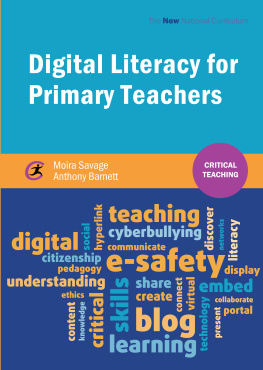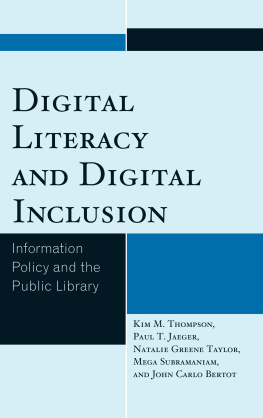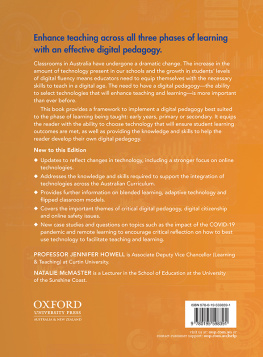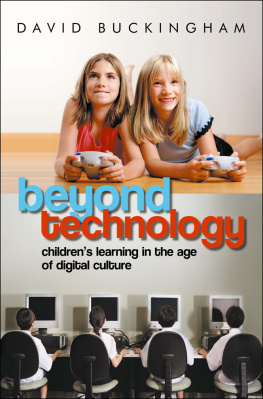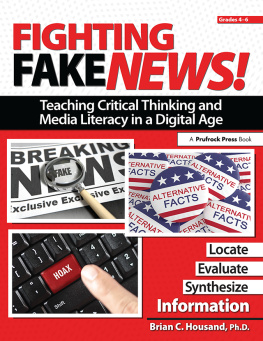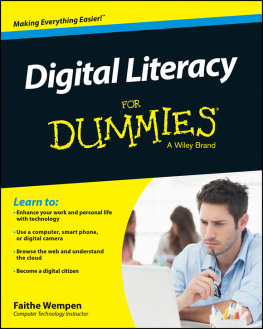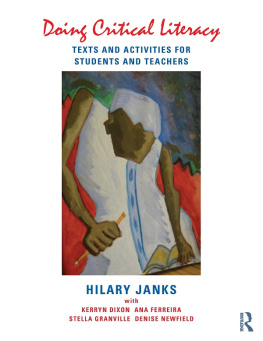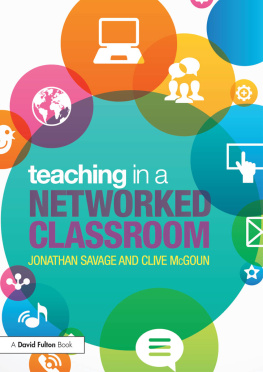The New National Curriculum
Digital Literacy for Primary Teachers

You might also like the following books from Critical Publishing
Teaching Systematic Synthetic Phonics and Early English
Jonathan Glazzard and Jane Stokoe
978-1-909330-09-2 Published March 2013
Primary School Placements: A Critical Guide to Outstanding Teaching
Catriona Robinson, Branwen Bingle and Colin Howard
978-1-909330-45-0 Published June 2013
Teaching and Learning Early Years Mathematics: Subject and Pedagogic Knowledge
Mary Briggs
978-1-909330-37-5 Published September 2013
Beyond Early Reading
Ed David Waugh and Sally Neaum
978-1-909330-41-2 Published September 2013
Inclusive Primary Teaching
Janet Goepel, Helen Childerhouse and Sheila Sharpe
978-1-909330-29-0 Published January 2014
Practical Ideas for Teaching Primary Science
Vivian Cooke and Colin Howard
978-1-909682-29-0 Published June 2014
Reflective Primary Teaching
Tony Ewens
978-1-909682-17-7 Published May 2014
Understanding and Enriching Problem Solving in Primary Mathematics
Patrick Barmby, David Bolden and Lynn Thompson
978-1-909330-69-6 Published May 2014
Most of our titles are also available in a range of electronic formats. To order please go to our website .
The New National Curriculum
Digital Literacy for Primary Teachers

First published in 2015 by Critical Publishing Ltd
All rights reserved. No part of this publication may be reproduced, stored in a retrieval system, or transmitted in any form or by any means, electronic, mechanical, photocopying, recording or otherwise, without prior permission in writing from the publisher.
The authors have made every effort to ensure the accuracy of information contained in this publication, but assume no responsibility for any errors, inaccuracies, inconsistencies and omissions. Likewise every effort has been made to contact copyright holders. If any copyright material has been reproduced unwittingly and without permission the Publisher will gladly receive information enabling them to rectify any error or omission in subsequent editions.
Copyright 2015 Moira Savage and Anthony Barnett
British Library Cataloguing in Publication Data
A CIP record for this book is available from the British Library
ISBN: 978-1-909682-61-0
This book is also available in the following e-book formats:
MOBI: 978-1-909682-62-7
EPUB: 978-1-909682-63-4
Adobe e-book reader: 978-1-909682-64-1
The rights of Moira Savage and Anthony Barnett to be identified as the Authors of this work have been asserted by them in accordance with the Copyright, Design and Patents Act 1988.
Cover and text design by Greensplash Limited
Project Management by Out of House Publishing
Typeset by Newgen Knowledge Works
Printed and bound in Great Britain by Bell & Bain, Glasgow
Critical Publishing
152 Chester Road
Northwich
CW8 4AL
www.criticalpublishing.com
Meet the authors

| Moira Savage In 1994 I entered the education profession as a primary school teacher and developed a specialism in information and communication technology (ICT) for learning and teaching. I became increasingly involved in ICT staff development culminating in joining the University of Worcester in 2003 as a senior lecturer in initial teacher training. I deliver computing/ICT modules to both undergraduate and postgraduate trainee teachers. I am also the Institute of Education e-learning coordinator and in 2011 I was awarded a University of Worcester Learning and Teaching Fellowship. My passion is exploring how new technologies can enhance learning. I have been involved in a large number of research projects and regularly supervise undergraduate and postgraduate students carrying out research. |

| Anthony Barnett I moved into higher education from teaching in inner London and Kent, where most of my early experience was with primary Key Stage 2 though also included some secondary teaching and educational research. Before starting my current post at the University of Worcester in 2000 I was a science and ICT co-ordinator. My PhD is in the area of innovative research methodology. My specific interests in ICT include the role of asynchronous discussion within blended learning approaches to teaching. Im currently also researching childrens involvement in a nursery school setting using Quick Time Virtual Reality and video data collection methods. My current teaching role includes undergraduate and postgraduate design and technology, creativity in foundation subject teaching, educational studies modules focusing on issues in ICT and support for postgraduate specialist ICT students and MA students in a range of subjects. |
Introduction
Overview of chapters
Digital literacy is becoming an increasingly prevalent term and this book gives a comprehensive and practical overview of what this means for todays teachers and learners. Each chapter explores key terminology, highlights links to the current Teachers Standards and the national curriculum (summary tables are included in the conclusion). Whatever your current level of technological capability, this book equips you with the necessary understanding of the key issues, suggests areas for professional reflection and highlights ideas for further reading. Whilst new technologies are, by their nature, exciting, the book remains grounded in established principles of good learning and teaching. Successful methods are not abandoned but re-envisaged through digital technologies and services. All decisions to use technology in teaching and learning must be pedagogically driven.
Chapter 1 Defining digital literacy
The book begins by establishing a definition for digital literacy relevant to you as a primary trainee teacher. Key questions are considered; for example whether we are talking about digital literacy or literacies. Your and the childrens role as consumer and author of digital content is explored. Four popular models of digital literacy are analysed and compared in relation to the computing curriculum for Key Stages 1 and 2.
Chapter 2 Implications for teaching: digital teaching
The chapter reviews established pedagogical principles and considers the role digital technologies play in assisting teachers, in the varied aspects of their role from communicating subject knowledge, assessment, feedback, administration and extending learning beyond the classroom and school day. A comprehensive consideration of technology affordances and pedagogy models is undertaken. Critical questions and case studies will help you develop confidence in your own e-learning pedagogy. Topical discussion themes are explored, for example the view of learners as digital natives and educators as digital immigrants.
Chapter 3 Implications for learning: digital learning
explores the facets of digital literacy from the primary learner perspective, revisiting and building on established theories of learning linked to memory and motivation. An overview of the latest research on technology and engagement is given, for example, multimodal learning and links to memory. Further, the importance of authentic learning experiences is emphasised where learners have a sense of autonomy and ownership.
Next page
